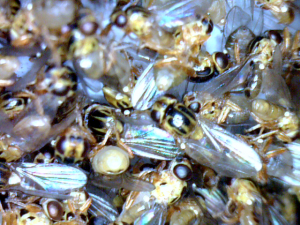Flies & Ladybirds
In Pests
Flies & Ladybirds
It may be cold and still Winter but already at PEST UK we are getting enquiries regarding Cluster Flies and Ladybirds. These creatures are ready to come out of hibernation and this is when they can become a problem in the house. They are not a health hazard but more of a nuisance pest. The timespan of this nuisance phase may be several weeks or even a couple of moths, depending on the weather. Hibernation emergence is effected by temperature, daylight length and in buildings artificial light and heat. It is always worth treating Cluster Flies and Ladybirds as otherwise the problem will get progressively worse as the population increases during the Summer as they have a genetic memory where their descendants (there may be several generations during the Spring, Summer and Autumn) come back to the same place to hibernate as their predecessors.

Cluster Flies
There are several species of Cluster Flies the main one lays eggs in the soil which hatch into grubs which then hunt an earthworm to feed on. This means that this type of Cluster Fly has greater numbers in wet Summers when earthworms are more successful. There is another species that breeds in piles of cow dung. As expected numbers near farms (often where dung heaps are poorly managed) are greater.

Ladybirds
These are not the ‘normal’ UK Ladybird but a type of ladybird that has spread from Europe. This is called the Harlequin Ladybird. One of the differences between the two species is that the Harlequin hibernates on mass in buildings.

Treatment
PEST UK is expert at treating these pests. Complete elimination will rarely happen but treatment reduces the problem and future problems.We use a combination of safe biodegradable residual sprays and also a ‘fogging’ insecticide treatment. Costs are typically £100 + VAT.


